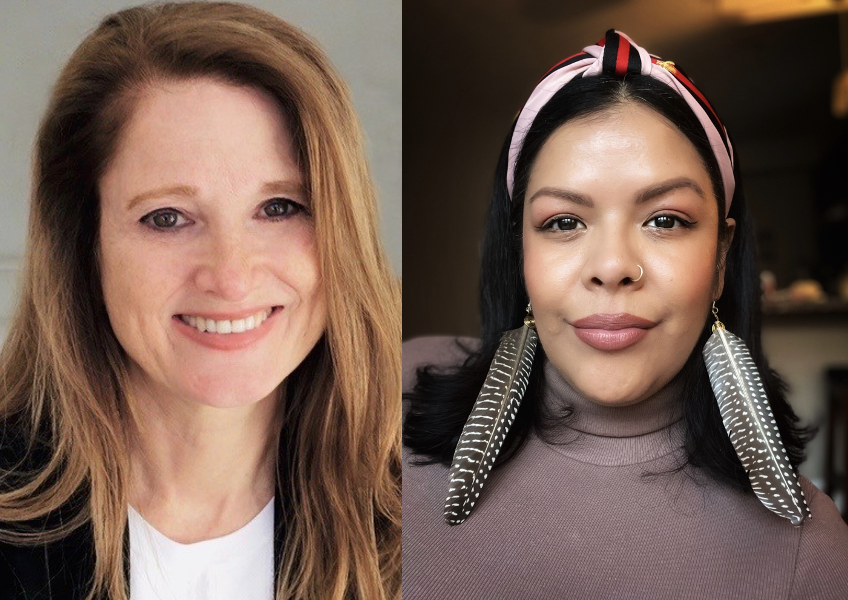Hello, AEA365 community! Liz DiLuzio here, Lead Curator of the blog. This week is Individuals Week, which means we take a break from our themed weeks and spotlight the Hot Tips, Cool Tricks, Rad Resources and Lessons Learned from any evaluator interested in sharing. Would you like to contribute to future individuals weeks? Email me at AEA365@eval.org with an idea or a draft and we will make it happen.

Hi I’m Kim Sabo Flores, CEO and co-founder of Hello Insight, an online learning and evaluation platform that supports thousands of youth-serving nonprofits across the country to continuously learn and improve their work with data and insights from young people. And I’m Andrea Juarez Mendoza, a participatory researcher with twenty years of experience engaging youth in social justice inquiry and action.
In 2022, we had the honor of working with six young researchers to create a guide that helps adult researchers and practitioners become allies who fully understand the value of youth voice in interpreting data that is for, by, and about them. Together, we asked: What does it look like to truly engage young people in making meaning of data that affects their lives – a process sometimes known as participatory meaning making?
Rad Resources
This Resource, called We Know Us: Guide to Participatory Meaning Making with Young People, gives an overview of key points the young people have synthesized through open dialogue, thought-provoking activities, and collaborative writing. The guide outlines why making meaning of data with young people is essential, the types of outcomes it yields, the roles and responsibilities involved, and critical tips for success. Some of the hot tips in the guide include:
- Create a culture of transparency and authentic engagement with young people.
- Select young people with a lens on Diversity Equity and Inclusion – ensuring that you engage a representative group of young people
- Be clear about the purpose of participation and its intended impact so youth understand how their feedback will and will not be used.
- Equitably compensating young people for their time and expertise
- Build trust amongst adult allies and young people
- Establish clear guidelines, roles, and responsibilities
- Ensure the meeting space is comfortable and easily accessible
- Fight against adultism
- Take time to build trust and relationships
- Keep an open mind to new ideas
- Hold everyone accountable for their actions – insensitivities or unwarranted behaviors
- Support young researchers’ technical skills
- Ensure that the data follows accessibility standards. Data format and presentation should be accessible to all, including those with visual impairment, color vision deficiency, and hearing impairments.
- Define and discuss the research foundations. Make sure everyone has common comprehension of terminology.
- Develop research training for young people and adult allies, if needed.
- Make data presentations clear. Present data in multiple formats (charts, drawings, stories, photos, music, etc.). Invite young people to create data visualizations.
- Enable young people to draw conclusions about the data. During meaning-making, include activities that allow young people to draw connections between their personal experiences and the data.
Lessons Learned
Young people have a clear understanding of their own lives and lived experiences that can and should provide researchers and evaluators with deeper insights into their data and findings. With young people at the table, making meaning and synthesizing data, more relevant recommendations will lead to actions that are grounded in the everyday realities of young people in their communities. We will conclude by sharing a quote from the young researchers who created this guide
“In order to create policies and programs that set up young people to succeed, it is critical that data reflects young people’s lived experiences. However, remember that data alone cannot bring accurate insights that lead to equitable and well-informed decisions. Data combined with meaning-making directly from relevant young people can strengthen the recommendations for change. This is why it is so important to engage young people and center their voices the right way.”
Do you have questions, concerns, kudos, or content to extend this aea365 contribution? Please add them in the comments section for this post on the aea365 webpage so that we may enrich our community of practice. Would you like to submit an aea365 Tip? Please send a note of interest to aea365@eval.org . aea365 is sponsored by the American Evaluation Association and provides a Tip-a-Day by and for evaluators. The views and opinions expressed on the AEA365 blog are solely those of the original authors and other contributors. These views and opinions do not necessarily represent those of the American Evaluation Association, and/or any/all contributors to this site.
